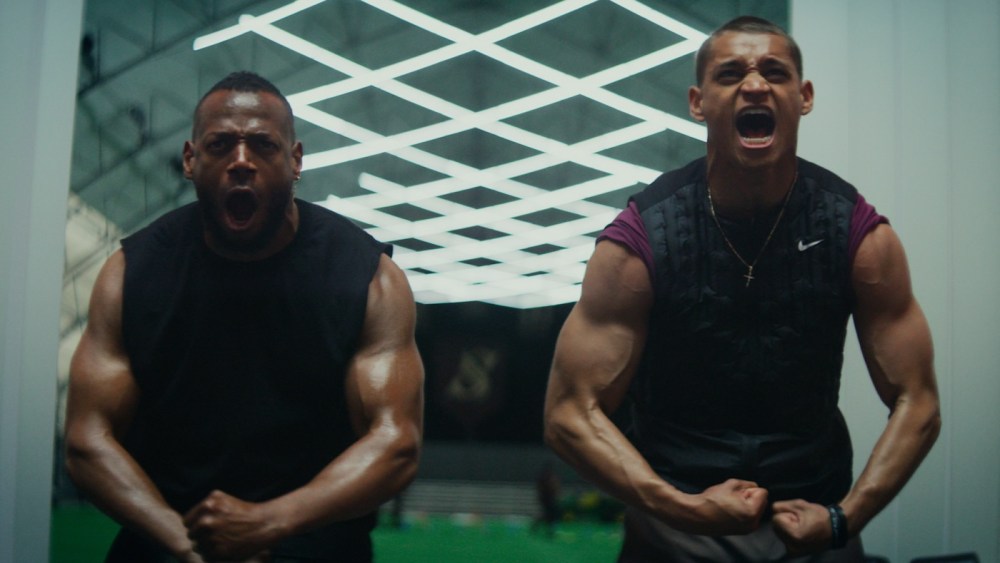Football Can Be a Lot Scarier Than Most People Realize
Cameron Cade has only one mission in life: to be the best player in American football. Nothing else matters to this college sports star (played by Tyriq Withers, a statue-like figure genre fans may recognize from “I Know What You Did Last Summer”), who’s on his way to the Combine, where pro teams scout up-and-coming players. Cam doesn’t just want to be drafted. He wants to be the GOAT. Right now, that title belongs to Isaiah White (Marlon Wayans), but the eight-time championship winner’s contract is up, and he’s looking for someone worthy enough to fill his shoes. “I’m Him!” young Cam shouts in a show of self-confidence.
But there can only be one GOAT, and “Him” looks long and hard at what it costs to succeed in one of America’s most beloved institutions. If the studio’s sinister (yet sexy) marketing makes it seem like a film for sports fans, think again. Director Justin Tipping (handpicked by producer Jordan Peele on the strength of his 2016 debut, “Kicks”) has an ultra-critical view of football, which is presented here as an ancient, quasi-occult practice turned toxic commodity — one that channels the public’s aggression into an almost theatrical form of staged combat, wherein casualties (or crippling concussions) come with the turf.
Tipping embraces the self-indulgent label of “elevated horror,” crafting a tense, trippy, ultra-stylized movie that’s so surreal at times, it might feel like you’re watching an extension of Matthew Barney’s “Cremaster Cycle.” Then again, there’s likely not a lot of overlap between that rarefied art project — No. 1 featured Busby Berkeley-like formations on a football field — and the populist audience Tipping and Peele are targeting here (Barney drilled even deeper into the sport with last year’s “Secondary” show). Perhaps a discomfiting recent body horror movie like “The Substance” gives a better idea of what to expect.
Heightened by sleek digital cinematography and a tense electronic score, “Him” ditches the sports-movie focus on competitive matches in favor of twisted mind games, a great many of which have life-and-death consequences. The whole thing comes down to two key players: Cam Cade and Isaiah White, whom the promising young quarterback has idolized for years. Now what if Isaiah invited Cam to train at his place in Texas, messing with the ambitious rookie’s head every step of the way? Like the devil on his shoulder, his agent (Tim Heidecker) is all for it. There is no angel advising him otherwise.
From an early age, Cam has been conditioned to believe that football is the most important thing there is. Make that the third most important: God comes first. Then family. Then football. Cam has his priorities in order, respecting his mother while trying to honor his late father, who instilled in Cam the belief that he could be the best player the sport ever knew. We see Cam’s dad planting the seed of this obsession during a childhood flashback. Cam sits in front of the TV, glued to the game that nearly ended Isaiah’s career.
Though “Him” skips past the grueling hours of conditioning Cam’s dad put his kid through, we know the score: Football parents are just as intense than stage moms. And why? Because having a child who goes pro can set them up for life. For people in Cam’s position, it’s a shortcut to the American dream. When Isaiah invites Cam to come train at his desert compound — which feels like a cross between a Brutalist bunker and a Bond villian’s lair — he’s already been warned by his doctor that another blow to the head could bench him for life.
Some horror movies hide their themes beneath a schlocky slasher surface. Not “Him,” which features any number of truly disconcerting situations — from the mascot that smashes Cam’s skull after practice to the finale in which the team’s owners appear in literal pigskins — but would be difficult to read in a strictly literal way. As symbols go, Cam appears shirtless or naked half the time, which means he comes off as both a well-sculpted character and a specimen to be objectified. He’s been brainwashed by someone else’s ideas of what it means to be a man. Just how much can we trust the perceptions of someone with a head injury? So much of what our protagonist experiences is distorted through levels of paranoia, hallucination or physical impossibility.
People die in this movie, and nobody seems to care, which could be a metaphor for the way the pro sports industry grinds up and disposes of its warriors. The blow Cam sustains early on inevitably causes us to think of concussions, a liability of the sport with far-ranging consequences. And Cam is no quitter, driven instead by his father’s words: “That’s what real men do, make sacrifices.” Of the many questions “Him” asks audiences, it’s this one, from Isaiah, that resonates with Cam: “What are you willing to sacrifice?”
We’ve already seen Isaiah’s injury, a gnarly fracture where his shin snapped and ripped through the skin. Best brace yourself for such visuals in a film that gets off on flashing X-rays, UV scans and CG renderings of the damage football does to the human body. Isaiah must have made some kind of Faustian bargain to keep playing, we assume, and “Him” slowly builds to the reveal of what that entails.
Will Cam accept the same pact, or is he not committed enough (which in this case would mean going home in a body bag)? He comes across as naive every time he complains of short cuts and cheating in a sport where everybody’s doing something shady to get ahead, from injections (so many needles!) to elaborate blood transfusions (the movie is drenched in the stuff). But Cam plays by the rules, which effectively makes him — in a wink to another Wayans movie — the last boy scout. Amid the thrills, “Him” gets you thinking about the sport and all that it demands, potentially making monsters of our heroes in the process. But as the saying goes: Don’t hate the player, hate the game.

